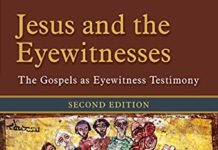
Ebook Info
- Published: 1997
- Number of pages: 226 pages
- Format: PDF
- File Size: 9.23 MB
- Authors: Richard Bauckham
Description
This volume challenges the current consensus in New Testament scholarship that each of the Gospels was written for a specific church or group of churches. These essays argue, from a wide range of evidence, that the Gospels were intended for general circulation throughout all the early churches and, hence, were written for all Christians. Loveday Alexander, Stephen C. Barton, Richard Bauckham, Richard Burridge, Michael B. Thompson, and Francis Watson examine such topics as the extent of communication between early Christian churches, book production and circulation in the Graeco-Roman world, the Gospel genre and its audience, the relationships between the Gospels, the faulty enterprise of reconstructing Gospel communities, and the hermeneutical and theological pitfalls of reading the Gospels as community texts. By putting in question a large body of assumptions that are almost universally accepted in contemporary scholarship, this book could fundamentally change both the method and the findings of Gospel interpretation.
User’s Reviews
Editorial Reviews: Review John Goldingay “This is a wonderful book, a bombshell in the playground of New Testament study. In writing on interpretation I have felt vaguely uneasy about the notion that the unmentioned specific congregation is of key importance to understanding Gospel narrative, but I lacked the imaginative spark to query this universal ‘given.’ Now Richard Bauckham and his friends have called the bluff. ‘Obvious’ after ‘obvious’ point (for instance, Gospels are different from Epistles; why should anyonewrite a narrative for their own congregation?) draws forth a grin, a ‘Yes,’ and a punch into the air from the reader. They also tell us lots of fascinating things about the real world in which the Gospels were written and disseminated, and point out some of the presuppositions of the consensus they explode and the significance of the case they press. I look forward to watching the fallout. “D. A. Carson “Not many books on the canonical Gospels are truly groundbreaking, but this one is. Richard Bauckham and his colleagues convincingly challenge one of the most deeply rooted assumptions of contempoary scholarship, namely, that the Gospels were written out of and for fairly restrictive early communities that enjoyed relatively little contact with the whole church. This book persuasively argues that both in intent and in reality the Gospels were written for ‘all Christians.’ It deserves the widest possible circulation among pastors, students, and scholars alike, and it promises to revamp more than one shibboleth.”Peter Stuhlmacher “The thesis that from the very beginning the four Gospels were intended not only for specific communities but also, and above all, for a general early Christian readership is substantiated by Bauckham and his coauthors in a historically clear and plausible fashion. This thesis is immediately obvious exegetically and hopefully will win quick acceptance. Bauckham’s view helps overcome a whole range of problems left unsolved by the form- and redaction-critical investigation of the Gospels that has been dominant until now, and it gives us a new perception of the Gospels’ significance as narrative proclamations of the life and messianic deeds of Jesus. “I. Howard Marshall “Unexamined assumptions are the bane of Gospel criticism. In this easily accessible, very readable symposium a group of leading scholars argues against the assumption that the Gospels were written for specific communities and reasserts that they were meant for reading by Christians everywhere. This thesis has important implications for the fashionable pursuit of reconstructing the readerships of the Gospels and then trying to explain the Gospels’ contents in terms of their readers’ needs; the way back to taking the Gospels seriously as biographies of Jesus is freed from yet another obstacle. This is a major work that could seriously alter the character of contemporary Gospel study for the better. “The Bible Today “A serious and helpful contribution to New Testament study that deserves to be engaged by other scholars.”Clergy Journal “Bauckham and his colleagues write persuasively against the consensus of modern Gospel scholarship. Fascinating reading.”America “[One] assumption of much modern Gospel study is the idea that each Gospel was written for a specific church or group of churches. This challenge to the current consensus . . . contends that the Gospels were really intended for more general circulation . . . A challenge that ought not to be ignored. “Restoration Quarterly “On occasion, books or articles appear that are truly groundbreaking or paradigm shifting . . . The Gospels for All Christians is one of these foundational works.” From the Back Cover This volume challenges the current consensus in New Testament scholarship that each of the Gospels was written for a specific church or group of churches. These essays argue, from a wide range of evidence, that the Gospels were intended for general circulation throughout all the early churches and, hence, were written for all Christians.Loveday Alexander, Stephen C. Barton, Richard Bauckham, Richard Burridge, Michael B. Thompson, and Francis Watson examine such topics as the extent of communication between early Christian churches, book production and circulation in the Graeco-Roman world, the Gospel genre and its audience, the relationships between the Gospels, the faulty enterprise of reconstructing Gospel communities, and the hermeneutical and theological pitfalls of reading the Gospels as community texts. By putting in question a large body of assumptions that are almost universally accepted in contemporary scholarship, this book could fundamentally change both the method and the findings of Gospel interpretation. About the Author Richard Bauckham is professor emeritus of New Testamentstudies at the University of St. Andrews, Scotland, seniorscholar at Ridley Hall, Cambridge, and fellow of both theBritish Academy and the Royal Society of Edinburgh. Read more
Reviews from Amazon users which were colected at the time this book was published on the website:
⭐This collection of essays is an important one in the history of New Testament scholarship, for it marks the first time a key assumption about the production of the Gospels has been tested. Since the early 1950s, scholars have tended to assume that the Evangelists wrote the Gospels in a particular community and for a particular community. It is important, as Richard Bauckham points out, to distinguish between a “community” and an “intended audience.” A community is group of persons in one geographic location. For example, a particular house church in Rome would be a “community.” However, the Evangelists may well have written for “target audiences” that were diverse and geographically distributed across the Roman Empire and beyond. St. Matthew would have written for Jewish Christians, and secondarily to Jews investigating Jesus, but he would have expected that his Gospel would circulate to a wide audience. The hermeneutical implication of this fact is that one cannot look through the Gospels to discover what particular problems a small community of Christians was facing at that particular time. Instead of being allegories of their own group of Christians, the Gospels represent a particular painting of the historical Jesus. And that is the fundamental contribution of the book: it redirects the focus of scholars away from hypothetical communities and towards the Jesus of history.Several points in the book were particularly helpful. First, as I already alluded to above, our authors consistently describe contemporary Gospels scholarship as utilizing unjustified allegorical exegesis. That is, the literal sense of the text is seen as rather besides the point. Instead, the Gospels reveal the “Sitz Em Leben” (setting in life) of their own audiences. One can discern not just the content of their audience, but also the problems they were facing the social hierarchy, and the experiences they had gone through. Only after parsing through these layers can one find a tidbit of information about the historical Jesus of Nazareth. Second, our authors refute this assumption by looking at the way books were produced and circulated in the ancient world. Contrary to many popular assumptions, reading was relatively widespread in the Greco-Roman period, and particularly for the Jews. Books were produced not for profit, but to communicate a message, sometimes for personal fame. Individuals would make personal copies and let friends make a copy, and libraries would do the same for interested readers. What this means is that books were expected to circulate. An author who intended his book to remain within a particular community would be making a foolish assumption- anyone living in the first century would know that books circulated widely.Third, and related to the above, people in the first century, and not just people of the upper classes, traveled widely. The authors point to the evidence for this within the New Testament and within the Patristic writings of second-century Christianity. This demonstrates that not only Paul, but the other apostles and the Lord’s brothers were traveling missionaries. Furthermore, Paul knows a number of individuals in the Roman church, even though he had not visited the Roman church personally. What this means is that they were traveling when he met them. The Empire, for all its faults, built efficient and safe roads, and major cities served as a hub for communication. For example, we see in the second century that Ignatius would write a letter to a major hub, and that church would make copies of the letter and send it to the surrounding cities. This contributed to the sense of a unified, worldwide movement. Far from rejecting any disagreement in the early Church, Bauckham argues, this interconnectedness and sense of unity meant that Christians knew and cared what was going on in other churches.All of this comes together to suggest that the conventional view of the audience of the Gospels is simply wrong. There is no reason in the world of the first century to suppose that the Evangelists wrote for a small, geographically local, community. Hence, their Gospels were for “all Christians.”
⭐There was a time when every other biblical scholar was feverishly looking for clues in the gospels for the kind of community each particular gospel grew out of. It was a long time ago. Anyone remember Raymond Brown? The form critic Bultmann?Bauckham’s “Gospels for all Christians” marshals essays from leading scholars to crush the idea. Here is the obvious facts: “The early Christian movement was not a scattering of isolated, self-sufficient communities with little or not communication between them, but quite the opposite: a network of communities were constant, close communication among themselves” (p 30).It was the era of greater mobility than any time until the modern era. Paul traveled, Peter traveled, Barnabas, Apollos, everybody seemed to travel from city to city, bringing letters and information and aid to other Christians in need.It is also clear that the “early Christian movement had a strong sense of itself as a worldwide movement” (p 33). Paul went to Jerusalem for consult with Peter and the church in Jerusalem – clearly, suggesting a knitted group of believers consulting one another. Revelation was sent to seven cities of believers. Also, 1 Clement showed one Roman bishop in charge and giving a scold to Corinthians in 95 AD while in AD 110 Ignatius of Antioch called the movement ‘catholic’, meaning universal, and he did it in a way that suggested the word was already in wide use,. Ignatius sent his letters, once again, to a circle of churches..So, where were the isolated communities Bultmann imagined? Not in any evidence we can discover. Bauckham concludes that the gospels were written for the entire worldwide Christian movement.Thompson argues that the early Christian movement was a holy internet, with Jerusalem at the hub. In his opinion, the gospels were written “within a few years of each other” (p 69).Alexander has a lively essay on book production in the ancient world, chock full of information. He finds good evidence that the Christian movement had a deep interest in book production. He compares this to the “Qumran sect which shows a similar surprising fecundity of literary production” ( 78).For anyone who has not read Richard Burridge’s important book “What are the Gospels”, you have a chance to pick up many of his main arguments as to the genre of the gospels by reading his essay. He insists that “the gospels are a form of ancient biography” (p 123).Bauckham has a second essay, where he argues that the author of John’s gospel clearly had read Mark.This is one essay collection you will want to read.
⭐
Keywords
Free Download The Gospels for All Christians: Rethinking the Gospel Audiences (New Testament Studies) in PDF format
The Gospels for All Christians: Rethinking the Gospel Audiences (New Testament Studies) PDF Free Download
Download The Gospels for All Christians: Rethinking the Gospel Audiences (New Testament Studies) 1997 PDF Free
The Gospels for All Christians: Rethinking the Gospel Audiences (New Testament Studies) 1997 PDF Free Download
Download The Gospels for All Christians: Rethinking the Gospel Audiences (New Testament Studies) PDF
Free Download Ebook The Gospels for All Christians: Rethinking the Gospel Audiences (New Testament Studies)





